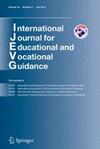Construction and initial validation of the scale “Goals for Future Design of the 2030 Agenda”
IF 1.7
3区 心理学
Q1 Arts and Humanities
International Journal for Educational and Vocational Guidance
Pub Date : 2023-09-15
DOI:10.1007/s10775-023-09626-7
引用次数: 0
Abstract
Abstract Sustainable development goals are used as guidance for future career and life design. The importance of including young people in the sustainability process is recognized also by recent vocational guidance literature. Nevertheless, the assessment of the Sustainable Development Goals itself presents a challenge. For these reasons, we validated a specific assessment instrument to investigate adolescents’ propensity to point out how much each of the 2030 Agenda goals for sustainable development may affect their future design. This article reports the development and psychometric requisites of the “ Goals for Future Design of the 2030 Agenda.” The scale recalls the 17 Sustainable Development Goals. The study involved 554 high school students. Initial exploratory factor analysis factorial structure showed a four-factor structure of the 17-item scale: (1) social/health, (2) environment/nature, (3) human rights/equal economic development, and (4) policy and democracy. A single-factor second-order structure also emerged from the confirmatory factor analysis. The results support the use of the scale in vocational guidance and career counselling activities to promote adolescents’ life design in a sustainable and inclusive way.“2030议程未来设计目标”规模的构建与初步验证
摘要可持续发展目标是未来职业和生活设计的指导。最近的职业指导文献也认识到将青年人纳入可持续性进程的重要性。然而,可持续发展目标的评估本身就是一项挑战。出于这些原因,我们验证了一种特定的评估工具,以调查青少年指出2030年可持续发展议程的每个目标对他们未来设计的影响程度的倾向。本文报道了“2030年议程未来设计目标”的发展和心理测量要求。该量表回顾了17项可持续发展目标。这项研究涉及554名高中生。初步探索性因子分析析因结构显示出17项量表的四因素结构:(1)社会/健康,(2)环境/自然,(3)人权/平等经济发展,(4)政策与民主。验证性因子分析也出现了单因素二阶结构。研究结果支持在职业指导和职业咨询活动中使用该量表,以可持续和包容的方式促进青少年的生活设计。
本文章由计算机程序翻译,如有差异,请以英文原文为准。
求助全文
约1分钟内获得全文
求助全文
来源期刊
CiteScore
3.10
自引率
16.70%
发文量
0
期刊介绍:
The International Journal for Educational and Vocational Guidance publishes articles in relation to work and leisure, career development, career counselling and guidance and career education, which have preferably either an international content (e.g. comparative studies, multi or cross-cultural perspectives, regional surveys, etc.) or contribute to topics of broad international interest (e.g. theoretical developments, ethical issues, etc.). Important national developments which are of wider interest can be included. All articles should present implications for practice.

 求助内容:
求助内容: 应助结果提醒方式:
应助结果提醒方式:


